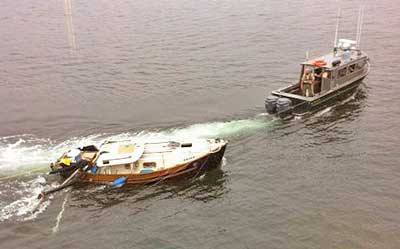Journal staff report
A Washington State Ferries investigative panel is recommending expanded training and more clearly defined roles on the bridge in the wake of a mid-September collision in which a super class ferry struck and caused irreparable damage to a motor yacht near the Lopez Island ferry terminal.
The board of inquiry, convened by WSF on the day of the crash, determined that human error and miscommunication between the captain and second mate contributed to the collision, and that it could have been avoided.
The Hyak, en route to Orcas Island, had just left the Lopez terminal and, with the second mate at the helm, was traveling at 18 knots as it overtook and then struck and breached the hull of the “Tasya” at about 1:38 p.m. A tug towing a barge and a smaller sailboat were also in the vicinity at the time.
The skipper and sole occupant of the 28-foot motor yacht were rescued by a nearby boater.
“The Board of Inquiry determined that the root cause of this incident was human error due to lack of situational awareness,” Ferries noted in the summary of the board’s 21-page report. “Specifically, the captain’s lack of situational awareness in combination with the second mate’s inexperience at the helm of the M/V HYAK resulted in an In-Extremis (grave) situation and eventual collision.”
Inundated by water, the damaged boat eventually sank while under tow by a state Fish & Wildlife boat.
According to the investigation, the captain had ordered the second mate to steer the ferry toward the port side to avoid the motor yacht as it approached the boat from behind.
The second mate, however, mistakenly set the rudder to starboard instead of port, where it remained for about four seconds, before the captain realized the error and tried without success to avoid the ensuing collision.
Ongoing training, for officers assigned to navigational watch in particular, and more clearly defined roles on the bridge are among six recommendations cited by the board of inquiry.
“We conducted a thorough and detailed investigation into what happened and why,” said David Moseley, assistant secretary of the state department of transportation’s ferries division. “We’re now shifting our focus to making improvements to prevent future incidents.”



